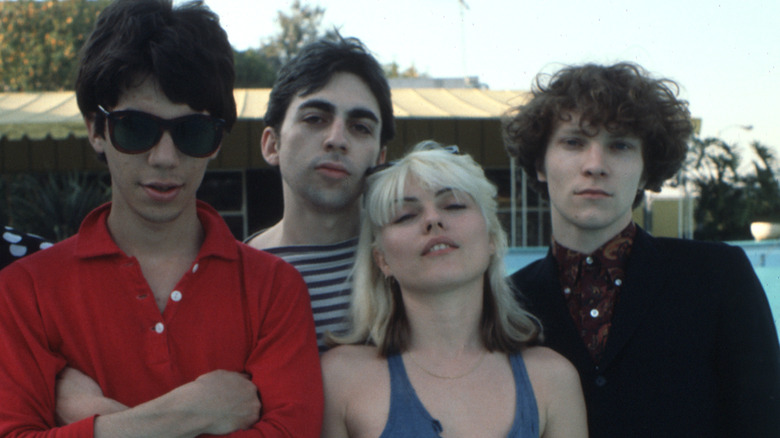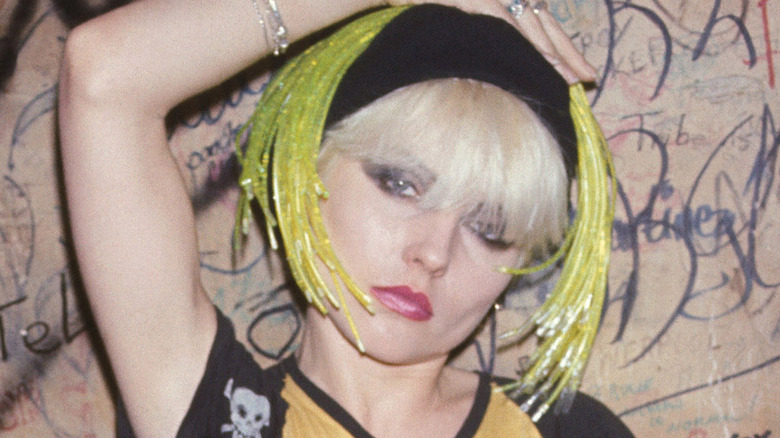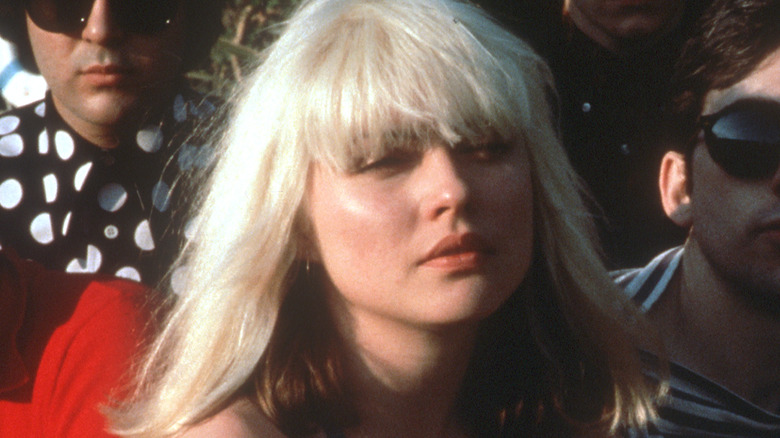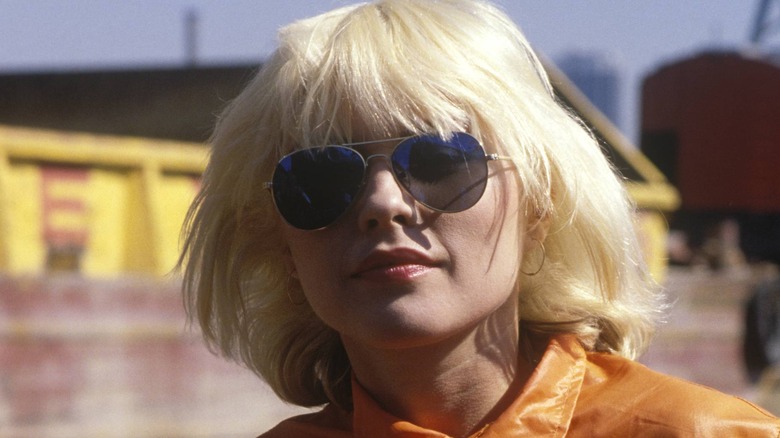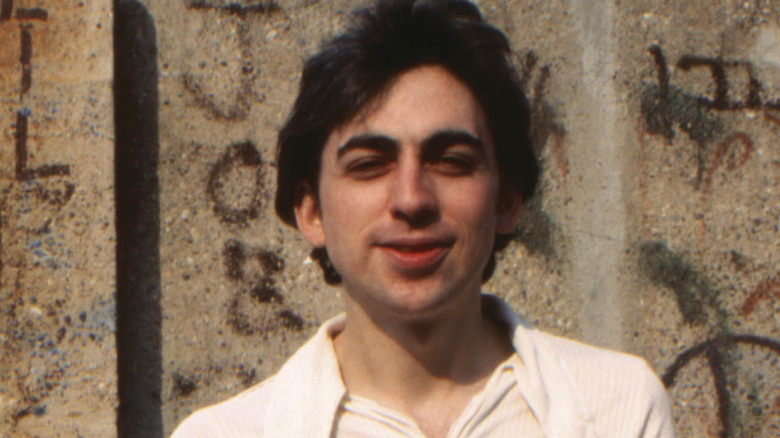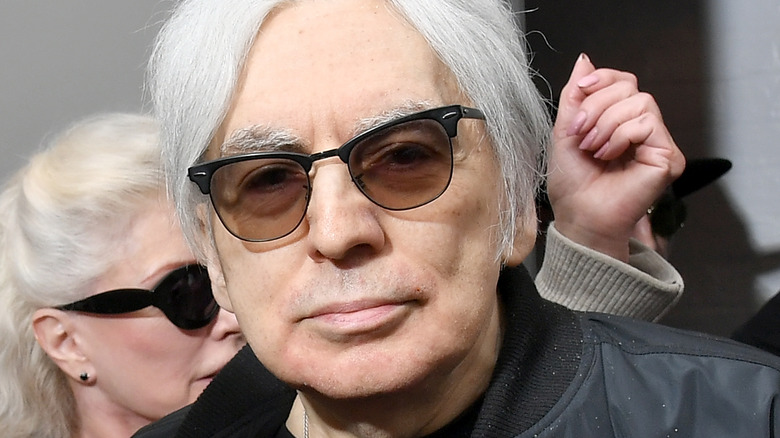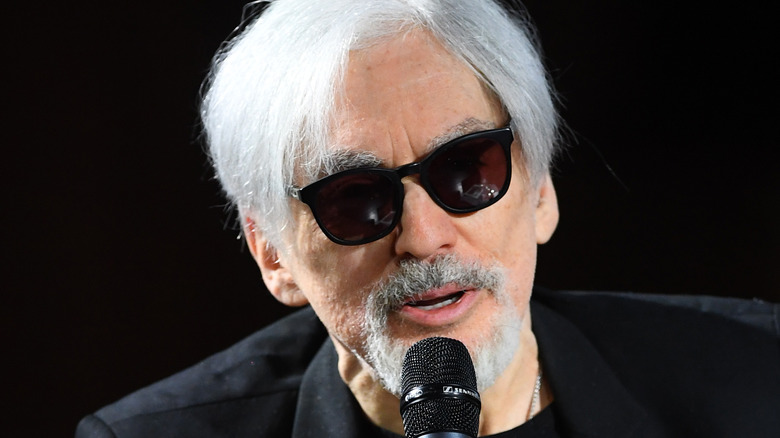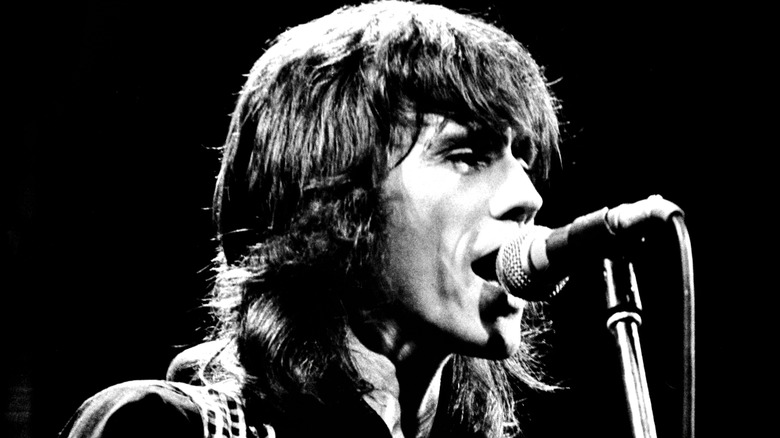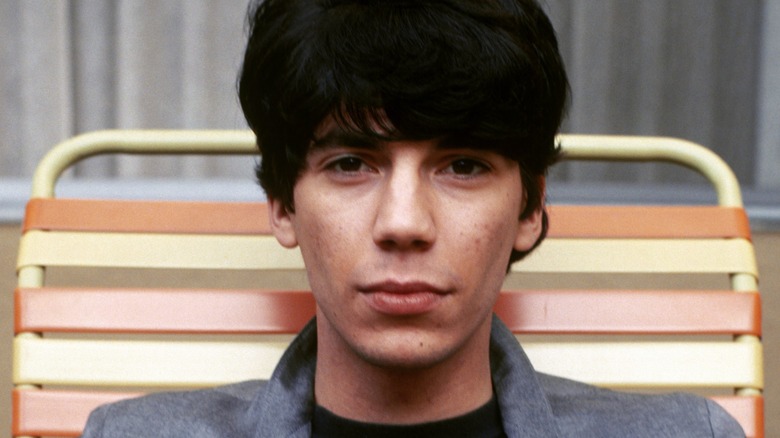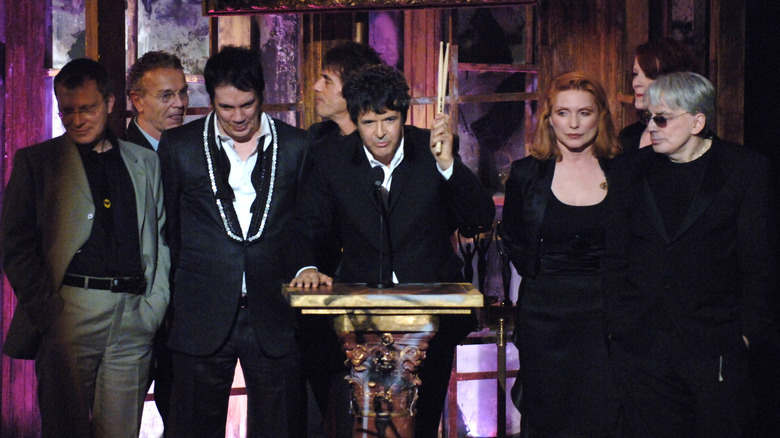Tragic Details About Blondie
There's probably never been a wildly successful rock band as versatile as Blondie. Starting out as a punk band in New York City in the mid-1970s, Blondie (emphatically a full band with many members and creative voices, beyond platinum-tressed lead singer Debbie Harry) smoothly pulled off its attempts at other then-emergent genres. Blondie scored hits with disco ("Heart of Glass"), reggae ("The Tide is High"), club music ("Atomic"), hard rock ("One Way or Another"), New Wave ("Dreaming"), and rap ("Rapture").
But as this group of seasoned former punks dominated the pop chart and pop culture in the late 1970s and early 1980s with its unpredictable and varied sound, its members experienced an equally baffling and widespread array of personal tragedies. The negative hits just kept on coming for Blondie's musicians, before the group was together, during its peak, and long after it broke up and reformed, too. Here are the most tragic stories lurking in the personal and professional lives of Blondie.
The following article includes allegations of domestic abuse, sexual assault, and addiction.
Debbie Harry was attacked and threatened by a former boyfriend
After attending college, Debbie Harry moved to New York City with aims of finding employment or major fame and success in show business. She landed acting auditions, but was never cast in screen projects and performed with a succession of bands that never took off, so in her twenties, she moved back to her home state of New Jersey. Harry struck up a romantic relationship with a man that quickly turned sour, frightening, and violent.
On one occasion, the man became convinced that Harry was carrying on a dalliance with another guy in her apartment; the boyfriend entered Harry's home by force and held the musician against her will. Accusing her of cheating, the former boyfriend placed a gun against Harry's head, threatening to kill her as well as sexually assault her. Soon thereafter, Harry moved back to New York City to give entertainment another shot. "I was just happy to get away from him and move on with my life," she wrote in her memoir "Face It" (via The Guardian).
Debbie Harry was the victim of a home invasion, robbery, and assault
Shortly after Debbie Harry met Chris Stein and set about forming the band that would become Blondie, the two musicians became a couple. Very late one night in the mid-1970s, they entered Stein's apartment and a stranger forced his way into the residence. "As we reached the front door that night, a dude came up from behind us with a knife," Harry wrote in "Face It" (via USA Today).
The assailant brandished a knife, menacingly threatening Harry and Stein, urging them to hand over any money or drugs they had in their possession. They didn't have any of either, sending the attacker into a new stage of the ordeal. He used a pair of pantyhose to tie up Stein's appendages, and then used a scarf to bind Harry's wrists. Then he forced her onto a bed while he stole what he could from the apartments, packing away musical instruments and a camera. "Then he untied my hands and told me to take off my pants," Harry explained, implying that he sexually assaulted her. "I'm very glad this happened pre-AIDS or I might have freaked," Harry wrote.
Was Debbie Harry nearly a Ted Bundy victim?
In the 1970s, Debbie Harry attests, she was almost kidnapped off a New York City street. "I was trying to get across town to an after-hours club. A little white car pulls up, and the guy offers me a ride," Harry told a reporter in 1989 (via Dazed). It was a short distance, and Harry accepted, but once she got inside the vehicle, she realized something was amiss. The Volkswagen Beetle was without many interior features, including the radio, window rollers, and door handles. Feeling the immediate need to escape, Harry managed to get the door open from the outside, and while forcing her way out, the driver took a sharp turn, sending the musician tumbling out of the speeding car.
Harry says she didn't think about the unsettling event until 1989, after reading about the execution of Ted Bundy, a serial killer who murdered women around the United States in the 1970s. "The whole description of how he operated and what he looked like and the kind of car he drove and the time frame he was doing that in that area of the country fit exactly. I said, 'My God, it was him.'" While there's no reason to doubt Harry's account, it's unlikely that she survived an encounter with Bundy; he was living in the western U.S., far from New York, in the mid-1970s. Harry's potential assailant remains an anonymous, unidentified unsavory character.
Chris Stein had a rare and painful disease
After nearly a decade together, Blondie fell apart in 1982. A major factor in the demise was the sudden, health-related unavailability of two crucial members. Guitarist Chris Stein developed a painful dermatological problem called pemphigus. According to WebMD, it's an autoimmune disorder that affects the skin, the mouth, and wetter parts of the body. "A chronic blistering skin disease," is how Stein described it to The Guardian. Genetically predisposed to pemphigus, Stein's case became severe and life-altering because he exacerbated it. "It was really annoying. Too much drug use — coke, dope, whatever the f*** — had compromised my immune system." Debbie Harry, Stein's Blondie and romantic partner of many years, stepped away from music, including a promising solo career, in order to provide full-time care.
"I didn't leave Manhattan for three years," Stein said about his lengthy convalescence, which included hospitalizations. Years after the medical issues concluded, Stein was convinced that the rock n' roll lifestyle played a major role. "At that time I was doing a lot of drugs and being crazy, and also being on the road for five years with very little rest," he told The Age.
Debbie Harry's tax and drug problems
Blondie sold about 40 million records, earning singer Debbie Harry a fortune. In retrospect, she wishes she would've more ably handled her money. "I was really only interested in making music and performing," Harry told The Guardian in 2019. In 1982, Harry and Chris Stein, her partner in life and music, received an astronomical bill from the Internal Revenue Service for unpaid taxes on their Blondie earnings. "The first two years we made a lot of money, and this accountant that we had just didn't pay our tax bills," Stein told The Age. While Harry and Stein would eventually square things with the IRS, the government agency saw to getting paid as much as it was owed as quickly as possible, seizing the couple's New York home and some of Harry's wardrobe.
When the IRS issues surfaced, Blondie had just broken up, and Stein was being hospitalized for the autoimmune skin disease, pemphigus. With little income arriving amid staggering tax and medical bills, Harry and Stein initially didn't know how they'd stay financially afloat, and they were also both regularly taking heroin. While Stein was under strict medical supervision, Harry would secretly administer heroin, although it made his condition worse. "I think that doctors and nurses knew that he was high all the time, but cast a blind eye because it kept him relatively pain-free and mentally less tortured," Harry said in "Face It" (via The Guardian).
Chris Stein's daughter died in 2023
Blondie guitarist Chris Stein was in a relationship with his band's singer, Debbie Harry, for 13 years, from the mid-1970s and into the 1980s. After they split, he connected with theatrical actor Barbara Sicuranza and they married in the late 1990s. Stein credits the influence of Sicuranza for his lasting abstention from abusing substances. "I met my wife and that was a very sobering experience," he told Big Issue. "She was more sober than me and that was something I aspired to."
In July 1993, Stein and Sicuranza welcomed a daughter named Akira. Shortly before Akira's 20th birthday in 2023, Stein announced via his Facebook page that his daughter had died from an overdose of drugs in May of that year. "She had been struggling for a few years and addiction took her," he wrote on behalf of his family. "There's a huge piece missing from our lives." A few days later, Harry shared her condolences for her goddaughter on the Blondie Instagram page. "She was just turning 20 and we lost her to fentanyl," Harry wrote.
Poor health prevents Chris Stein from touring
One long-standing and painful health issue, an autoimmune disease, ended Chris Stein's tenure in Blondie in 1982. After the group reunited in the late 1990s and stayed back together into the 21st century, serious medical issues would once again limit Stein's involvement with the popular rock band he helped create in the 1970s.
In April 2022, on X, formerly known as Twitter, Stein revealed that he'd been diagnosed with the heart condition atrial fibrillation, characterized by a concerning irregular heartbeat (per the Mayo Clinic). The prescribed medications that Stein takes to control the issue leave him extremely tired and weak, so he's unable to keep up with the physical demands of playing on stage in new cities every night for months on end. "My brain is working great but my body's not up to the task of touring now," Stein wrote. "I'm still all in with recording and other band projects."
Ivan Kral died
Ivan Kral was born in Czechoslovakia in 1948, the same year that the Soviet Union invaded the nation and instituted communist rule. Kral's father, a reporter for state news agency CTK and who had publicly foretold those political events through his work, fled with his family to the U.S. in 1966; Kral would carry refugee status until he attained full American citizenship in 1981. Once a member of the popular Czechoslovakian band Saze, Kral flourished in the New York rock scene and played with various bands, including an early version of Blondie. One of the group's first guitarists, Kral left the group before it released its first full-length album in 1976.
Blondie was part of the New York punk scene centered around the CBGB club, and Kral would later join colleague Patti Smith's band as a guitarist, bassist, and songwriter, documenting that era of rock history via the 1976 movie "The Blank Generation." Kral would go on to collaborate with Iggy Pop, John Cale of the Velvet Underground, and Noel Redding of the Jimi Hendrix Experience, alternately writing songs or playing guitar, keyboard, or bass. In February 2020, Kral's wife, Cindy, told news outlets that her husband had died at their home in Ann Arbor, Michigan. The cause of death: cancer. Kral was 71 years old.
Jimmy Destri's 25-year cocaine addiction
Blondie found massive commercial success when it veered away from punk and into New Wave and synth-pop. That allowed founding member Jimmy Destri to ascend to a more prominent place in the band's sound: operating the synthesizers, keyboards, and other electronic instruments.
From the early 1980s onward, when Blondie was among the most popular bands in the world, and then well into the 21st century, Destri dealt with an addiction to cocaine that enveloped his life. In the 2000s, the musician estimates, he was spending about $1,000 on the drug every day for five years, a period he categorized as "below rock-bottom" in a statement. Stints at multiple rehab programs and live-in facilities at a cost of several hundreds of thousands of dollars didn't help, until one finally did help Destri attain sobriety. Into his recovery, Destri became a certified drug and alcohol counselor in 2008, and took a job helping other addicts kick drugs at Carnegie Hall Institute, a substance abuse rehabilitation center.
Lawsuits and public spats tore Blondie apart
After a 15-year hiatus, Blondie played a few radio station festivals in 1997, a warm-up for a world tour, and a new album, "No Exit." Prime-era members Debbie Harry, Chris Stein, Clem Burke, and Jimmy Destri participated in the new Blondie. Notably absent from the tour and LP: late 1970s members Nigel Harrison and Frank Infante. The rest of the band didn't ask them to participate, and the two excluded musicians filed suit against their former cohort. In court documents, the two pointed out that while Blondie split in 1982, all then-current band members remained partners in a financial agreement concerning the group's business affairs. Harrison and Infante cited financial wrongdoing on the part of their bandmates, suing for $1 million and to block the reunion from taking place, at least under the Blondie name. The suit was unsuccessful on both counts.
In 2006, the Rock and Roll Hall of Fame inducted Blondie, including Harrison and Infante. Before the ceremony, Harry told the Associated Press (via Today) that a full, happy reunion was out of the question. "There was no excuse for them suing us," Harry said. "That ended it." At the Rock Hall event, Harrison and Infante confronted the other members of Blondie when they were onstage and about to perform. "Debbie, aren't we allowed?" Infante yelled (per MTV). "I thought the group was being inducted tonight." Harry's curt reply: "Can't you see my real band is up there?"
If you or anyone you know needs help with domestic abuse, sexual assault, or addiction issues, contact the relevant resources below:
-
The National Domestic Violence Hotline at 1−800−799−7233. You can also find more information, resources, and support at their website.
-
The Rape, Abuse & Incest National Network website or contact RAINN's National Helpline at 1-800-656-HOPE (4673).
-
The Substance Abuse and Mental Health Services Administration website or contact SAMHSA's National Helpline at 1-800-662-HELP (4357).
